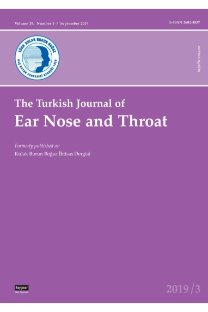İzole sfenoid sinüzite bağlı kavernöz sinüs sendromundaki değişken orbital semptomlar
Kırk yaşında erkek hasta, uzun süredir var olan sol tarafta başağrısı, pitozis, propitozis ve ekstraokü- ler kas paralizisi ve sonradan gelişen sağ tarafta başağrısı, propitozis, kemozis, diplopi, ekstraoküler kas paralizisi ve trigeminal duyu kaybı nedeniyle başvurdu. Manyetik rezonans görüntülemede sol orbital, intrasellar ve parasellar alana doğru genişle- yen kavernöz nodül ve sağ kavernöz sinüs ve orbital apekse doğru ilerleyen yumuşak doku kitlesi saptan- dı. Sfenoid sinüzite bağlı kavernöz sinüs sendromu endoskopik transnazal sfenoidotomi sonrası iyileşti. Bu tanısal karmaşa ve tedavi seçenekleri güncel literatür eşliğinde sunuldu
Anahtar Kelimeler:
Kavernöz sinüs sendromu, tanısal karmaşa, endoskopik transnazal sfenoidotomi, izole sfenonid sinüzit
Alternating orbital symptoms in cavernous sinus syndrome due to isolated sphenoid sinusitis
A 40-year-old male with left-sided headaches, ptosis, proptosis and extra-ocular muscle paralysis developed right-sided headaches, proptosis, chemosis, diplopia, extra-ocular muscle paralysis and trigeminal sensory loss. An enhancing left orbital, intrasellar and parasellar cavernous nodule on magnetic resonance imaging progressed into a right cavernous sinus and orbital apex soft tissue mass. Cavernous sinus syndrome from sphenoid sinusitis resolved after endoscopic transnasal sphenoidotomy. This diagnostic complexity and its treatment options are discussed according to current literature.
Keywords:
Cavernous sinus syndrome, diagnostic complexity, endoscopic transnasal sphenoidotomy, isolated sphenoid sinusitis,
___
- Lee JH, Lee HK, Park JK, Choi CG, Suh DC. Cavernous sinus syndrome: clinical features and differential diagnosis with MR imaging. AJR Am J Roentgenol 2003;181:583-90.
- Winslow JB. An anatomical exposition of the structure of the human body. 6th ed. London: A Donaldson & C Elliot; 1772. p. 2, 316.
- Kyoda K, Nakamura S, Takeshima M, Matano S, Masuda S, Matsuda T, et al. Cavernous sinus syn- drome associated with nonsecretory myeloma. Intern Med 1999;38:988-90.
- Keane JR. Cavernous sinus syndrome. Analysis of 151 cases. Arch Neurol 1996;53:967-71.
- Fernández S, Godino O, Martínez-Yélamos S, Mesa E, Arruga J, Ramón JM, et al. Cavernous sinus syn- drome: a series of 126 patients. Medicine (Baltimore) 2007;86:278-81.
- Deans JA, Welch AR. Acute isolated sphenoid sinus- itis: a disease with complications. J Laryngol Otol 1991;105:1072-4.
- Cannon ML, Antonio BL, McCloskey JJ, Hines MH, Tobin JR, Shetty AK. Cavernous sinus thrombosis com- plicating sinusitis. Pediatr Crit Care Med 2004;5:86-8.
- Lew D, Southwick FS, Montgomery WW, Weber AL, Baker AS. Sphenoid sinusitis. A review of 30 cases. N Engl J Med 1983;309:1149-54.
- Ruoppi P, Seppä J, Pukkila M, Nuutinen J. Isolated sphenoid sinus diseases: report of 39 cases. Arch Otolaryngol Head Neck Surg 2000;126:777-81.
- Gilony D, Talmi YP, Bedrin L, Ben-Shosan Y, Kronenberg J. The clinical behavior of isolated sphenoid sinusitis. Otolaryngol Head Neck Surg 2007;136:610-5.
- Martin TJ, Smith TL, Smith MM, Loehrl TA. Evaluation and surgical management of isolated sphenoid sinus disease. Arch Otolaryngol Head Neck Surg 2002;128:1413-9.
- Erylmaz A, Dursun E, Saylam G, Göçer C, Dağli M, Korkmaz H. Endoscopic transnasal sphenoidotomy with or without ethmoidectomy. Kulak Burun Bogaz Ihtis Derg 2007;17:90-5.
- ISSN: 2602-4837
- Yayın Aralığı: Yılda 4 Sayı
- Başlangıç: 1991
- Yayıncı: İstanbul Üniversitesi
Sayıdaki Diğer Makaleler
Astımlı ve astımlı olmayan nazal polipozisli hastaların nazal sekresyonlarındaki sitokin seviyeleri
Aleksandar PERİĆ, Danilo VOJVODİĆ, Vesna RADULOVİĆ, Olivera MİLJANOVİĆ
Erdem GÜVEN, Alper Mete UĞURLU, Karaca BAŞARAN, Salih Onur BASAT, Barış YİĞİT, Günter HAFIZ, Samet Vasfi KUVAT
Türk toplumunda timpanik kavite hacminin Cavalieri yöntemiyle ölçülmesi
Hasan Mete İNANÇLI, Şefik Sinan KÜRKÇÜOĞLU, Ayla KÜRKÇÜOĞLU, Murat ENÖZ, Can PELİN, Ragıba ZAGYAPAN
İzole sfenoid sinüzite bağlı kavernöz sinüs sendromundaki değişken orbital semptomlar
